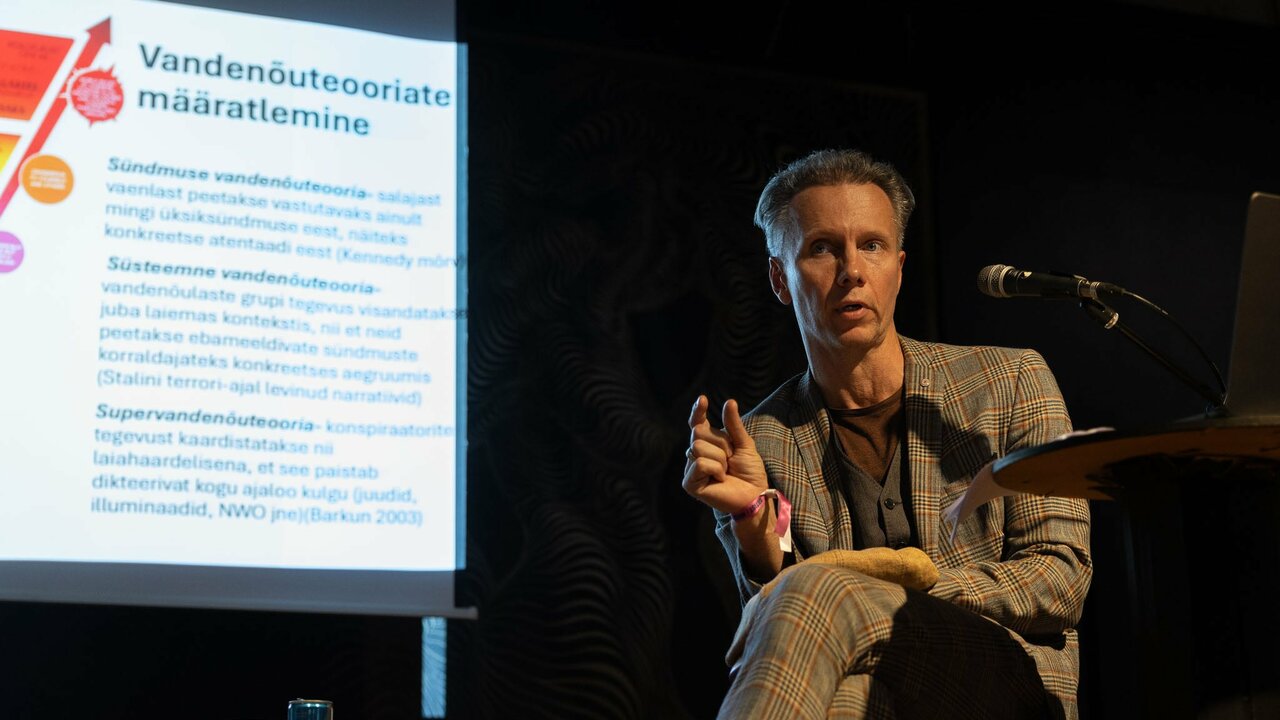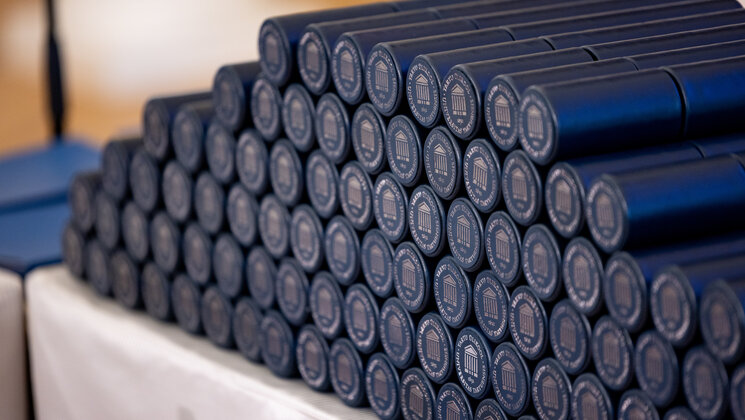-
Faculty of Arts and HumanitiesDean's Office, Faculty of Arts and HumanitiesJakobi 2, r 116-121 51005 Tartu linn, Tartu linn, Tartumaa EST0Institute of History and ArchaeologyJakobi 2 51005 Tartu linn, Tartu linn, Tartumaa EST0Institute of Estonian and General LinguisticsJakobi 2, IV korrus 51005 Tartu linn, Tartu linn, Tartumaa EST0Institute of Philosophy and SemioticsJakobi 2, III korrus, ruumid 302-337 51005 Tartu linn, Tartu linn, Tartumaa EST0Institute of Cultural ResearchÜlikooli 16 51003 Tartu linn, Tartu linn, Tartumaa EST0Institute of Foreign Languages and CulturesLossi 3 51003 Tartu linn, Tartu linn, Tartumaa EST0School of Theology and Religious StudiesÜlikooli 18 50090 Tartu linn, Tartu linn, Tartumaa EST0Viljandi Culture AcademyPosti 1 71004 Viljandi linn, Viljandimaa EST0Professors emeriti, Faculty of Arts and Humanities0Associate Professors emeriti, Faculty of Arts and Humanities0Faculty of Social SciencesDean's Office, Faculty of Social SciencesLossi 36 51003 Tartu linn, Tartu linn, Tartumaa EST0Institute of EducationJakobi 5 51005 Tartu linn, Tartu linn, Tartumaa EST0Johan Skytte Institute of Political StudiesLossi 36, ruum 301 51003 Tartu linn, Tartu linn, Tartumaa EST0School of Economics and Business AdministrationNarva mnt 18 51009 Tartu linn, Tartu linn, Tartumaa EST0Institute of PsychologyNäituse 2 50409 Tartu linn, Tartu linn, Tartumaa EST0School of LawNäituse 20 - 324 50409 Tartu linn, Tartu linn, Tartumaa EST0Institute of Social StudiesLossi 36 51003 Tartu linn, Tartu linn, Tartumaa EST0Narva CollegeRaekoja plats 2 20307 Narva linn, Ida-Virumaa EST0Pärnu CollegeRingi 35 80012 Pärnu linn, Pärnu linn, Pärnumaa EST0Professors emeriti, Faculty of Social Sciences0Associate Professors emeriti, Faculty of Social Sciences0Faculty of MedicineDean's Office, Faculty of MedicineRavila 19 50411 Tartu linn, Tartu linn, Tartumaa ESTInstitute of Biomedicine and Translational MedicineBiomeedikum, Ravila 19 50411 Tartu linn, Tartu linn, Tartumaa ESTInstitute of PharmacyNooruse 1 50411 Tartu linn, Tartu linn, Tartumaa ESTInstitute of DentistryL. Puusepa 1a 50406 Tartu linn, Tartu linn, Tartumaa ESTInstitute of Clinical MedicineL. Puusepa 8 50406 Tartu linn, Tartu linn, Tartumaa ESTInstitute of Family Medicine and Public HealthRavila 19 50411 Tartu linn, Tartu linn, Tartumaa ESTInstitute of Sport Sciences and PhysiotherapyUjula 4 51008 Tartu linn, Tartu linn, Tartumaa ESTProfessors emeriti, Faculty of Medicine0Associate Professors emeriti, Faculty of Medicine0Faculty of Science and TechnologyDean's Office, Faculty of Science and TechnologyVanemuise 46 - 208 51003 Tartu linn, Tartu linn, Tartumaa ESTInstitute of Computer ScienceNarva mnt 18 51009 Tartu linn, Tartu linn, Tartumaa ESTInstitute of GenomicsRiia 23b/2 51010 Tartu linn, Tartu linn, Tartumaa ESTEstonian Marine Institute0Institute of PhysicsInstitute of ChemistryRavila 14a 50411 Tartu linn, Tartu linn, Tartumaa EST0Institute of Mathematics and StatisticsNarva mnt 18 51009 Tartu linn, Tartu linn, Tartumaa EST0Institute of Molecular and Cell BiologyRiia 23, 23b - 134 51010 Tartu linn, Tartu linn, Tartumaa ESTTartu ObservatoryObservatooriumi 1 61602 Tõravere alevik, Nõo vald, Tartumaa EST0Institute of TechnologyNooruse 1 50411 Tartu linn, Tartu linn, Tartumaa ESTInstitute of Ecology and Earth SciencesJ. Liivi tn 2 50409 Tartu linn, Tartu linn, Tartumaa ESTProfessors emeriti, Faculty of Science and Technology0Associate Professors emeriti, Faculty of Science and Technology0Institute of BioengineeringArea of Academic SecretaryHuman Resources OfficeUppsala 6, Lossi 36 51003 Tartu linn, Tartu linn, Tartumaa EST0Area of Head of FinanceFinance Office0Area of Director of AdministrationInformation Technology Office0Administrative OfficeÜlikooli 17 (III korrus) 51005 Tartu linn, Tartu linn, Tartumaa EST0Estates Office0Marketing and Communication OfficeÜlikooli 18, ruumid 102, 104, 209, 210 50090 Tartu linn, Tartu linn, Tartumaa EST0Area of Vice Rector for ResearchUniversity of Tartu LibraryW. Struve 1 50091 Tartu linn, Tartu linn, Tartumaa EST0Grant OfficeArea of Vice Rector for DevelopmentCentre for Entrepreneurship and InnovationNarva mnt 18 51009 Tartu linn, Tartu linn, Tartumaa EST0University of Tartu Natural History Museum and Botanical GardenVanemuise 46 51003 Tartu linn, Tartu linn, Tartumaa EST0International Cooperation and Protocol Office0University of Tartu MuseumLossi 25 51003 Tartu linn, Tartu linn, Tartumaa EST0Area of RectorRector's Strategy OfficeInternal Audit OfficeArea of Vice Rector for Academic AffairsOffice of Academic AffairsUniversity of Tartu Youth AcademyUppsala 10 51003 Tartu linn, Tartu linn, Tartumaa EST0Student Union OfficeÜlikooli 18b 51005 Tartu linn, Tartu linn, Tartumaa EST0Centre for Learning and Teaching
Andreas Ventsel speaks at the inaugural lecture on the semiotics of deterrence and Estonian security

On Wednesday, 13 November at 16:15, Andreas Ventsel, Professor of Political and Sociosemiotics at the University of Tartu, will give his inaugural lecture (in Estonian) “The semiotics of deterrence and strategic communication in the field of security” in the White Hall of the University of Tartu Museum.
In security policy, deterrence means an attempt made to divert an adversary from what they have planned. Its purpose is to deter the adversary from taking an action by threatening them with excessive costs or damage. In addition to developing one’s own strategy, it is equally important in terms of security to assess the credibility and effectiveness of the adversary’s deterrence.
In the case of hybrid conflicts, the role of deterrence is broader, encompassing not only military measures but also narratives constructed through media and communication. “Nowadays, conflict is framed, justified and the adversary defined largely in terms of meanings that influence societal attitudes towards deterrence. This also points to the importance of the media and its consumers in research on the subject,” said Ventsel.
Deterrence is often successful when it emphasises something that is meaningful to the adversary in terms of identity and cultural memory. “For example, e-Estonia is not just an IT infrastructure, it is also ingrained in our self-image as an innovative and digitally advanced nation. This, in turn, can increase our societal vulnerability to adversary deterrence,” the professor explained. According to him, one of the cornerstones of Estonia's comprehensive security strategy is psychological protection, which includes, among other things, explaining potential threats to the public. “This will help maintain the overall will to defend,” said Ventsel.
In his inaugural lecture, Andreas Ventsel will address the strategy of deterrence from the perspective of semiotic and cultural studies. Semiotic analysis helps to contextually explain how states and non-state actors (e.g. terrorist groups) strategically deter each other, while at the same time undermining the credibility of an adversary's deterrence. The lecture presents the first ideas of a research framework for strategic communication of deterrence, based on semiotics, relational ontology and the action research paradigm.
Andreas Ventsel received the doctoral degree in semiotics at the University of Tartu in 2009. In 2024, he became Professor of Political and Sociosemiotics. In his research, he develops a method for the semiotic analysis of political semiotics and information influence activities, combining semiotics, cultural and political studies, visual culture studies, discourse analysis and security studies. Ventsel attaches importance to the practical outcome of his research, which can be used to bring about social change. His work has focused on broad-based academic research on power relations, conflict, strategically disseminated conspiracy theories and threat discourse, the application of research findings to the development of courses and learning aids, and research-based collaboration with strategic communication agencies. He is also currently leading three research projects on the above.
Andreas Ventsel has lectured at both bachelor’s and master’s levels at many Estonian institutions of higher education, including Tallinn University, the Estonian Academy of Arts, the Estonian University of Life Sciences, the Institute of Theology of the Estonian Evangelical Lutheran Church and the Estonian Military Academy. He has also been a visiting research fellow or lecturer at several universities abroad: the University of Turin, Georgian National University, Tel Aviv University, University of Beira Interior, Aristotle University of Thessaloniki, Cyprus University of Technology and the University of Bologna.
In 2024, he and Research Fellow in Semiotics Mari-Liis Madisson were given the national research award in humanities for their publication “Semiotic analysis of politics-semiotics, information influence activities and conspiracy theories”.
The aim of the inaugural lecture is to give the new professor an opportunity to introduce himself, his specialisation and field of research. At the end of the public lecture, the audience will be able to ask the professor questions. Everyone interested is welcome. A live webcast of the inaugural lecture will be available on UTTV.
Inaugural lecture of Andreas Ventsel
Read more similar news






